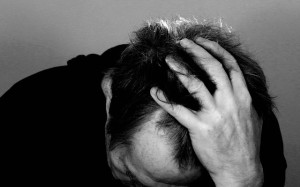Contributor: Crystal Karges, MS, RDN, IBCLC, Special Projects Coordinator at Eating Disorder Hope/Addiction Hope
 For many individuals, the experience of trauma is a reality that is lived with on a daily basis. While trauma can occur in many forms, learning to cope with a traumatic experience in a healthy way can be a difficult task.
For many individuals, the experience of trauma is a reality that is lived with on a daily basis. While trauma can occur in many forms, learning to cope with a traumatic experience in a healthy way can be a difficult task.
Whether a person experiences trauma mentally, emotionally, physically, sexually, or psychologically, the toll of a traumatic experience can result in devastating consequences. Many people who have experienced some form of trauma inadvertently learn to cope with the many layers of emotion that come with these incidents.
Traumatic events can also lead to many psychological and emotional complications, which can escalate existing problems or situations.
How Drugs Become a Coping Mechanism
Anyone who has been affected by a traumatic event will look towards a way to cope through this difficult situation. For individuals who may be biologically predisposed to developing an addiction to substance abuse, the experience of trauma can trigger the development of addictive behaviors.
For some people who have suffered with trauma, a common way of seeking relief from the pain emotions and experiences is by numbing out or finding a way to temporary escape from the whirlwind of things they are undergoing. To some people, drugs or alcohol offer this form of relief albeit temporary, and even in the face of detrimental consequences, an addiction can spiral out of control.
The Use of LSD
 While each trauma sufferer may find an individual way to cope, drug users with underlying trauma may look to LSD, a hallucigenic drug known by the street names of blotter, acid, trips, dots, and more. The effects of LSD can be unpredictable but are commonly experienced anywhere from 30 to 90 minutes after ingestion.
While each trauma sufferer may find an individual way to cope, drug users with underlying trauma may look to LSD, a hallucigenic drug known by the street names of blotter, acid, trips, dots, and more. The effects of LSD can be unpredictable but are commonly experienced anywhere from 30 to 90 minutes after ingestion.
A person who is using LSD may experience extreme mood swings and changes in their emotions, may become delusional or experience visual hallucinations. For the sufferer dealing with trauma, getting high off of LSD may offer an alternative reality that is less painful than what they may currently be dealing with.
The Danger of Leaving Trauma Unaddressed
No matter how intense or difficult a traumatic situation may be, the truth is that LSD or any other drug, alcohol, or substance can allow a person to heal or take away the pain. The relief that may be felt is indeed temporary and can only lead to consequences that alter the course of someone’s life permanently.
Seeking out professional help and counsel is the most therapeutic way to heal from trauma effectively. While it is difficult to face the pains from the past, choosing to ignore it or escape from it will not allow healing, and ultimately, freedom from a traumatic experience.
Seeking Professional Assistance for Drug Abuse and Trauma
 Many co-occurring treatment programs offer support for substance abuse and other mental health disorders, including post-traumatic stress disorder, anxiety, depression and more. Working through and healing from underlying trauma can help a person let go of a need for substance abuse, including an addiction to LSD.
Many co-occurring treatment programs offer support for substance abuse and other mental health disorders, including post-traumatic stress disorder, anxiety, depression and more. Working through and healing from underlying trauma can help a person let go of a need for substance abuse, including an addiction to LSD.
If you or a loved one has suffered from a traumatic event and has subsequently fallen into an addiction with LSD, it is important to know that you can seek out necessary help for healing and recovery. This begins by talking to someone about your traumatic past and history instead of hiding from it or ignoring it.
Talking to a Professional
Confide in a loved one or professional you can trust, such as a counselor or therapist. Acknowledging and processing the trauma that you may have been exposed to is a crucial step in understanding the possible connection between the trauma and LSD addiction.
Learning to heal without the clouded illusion of substance abuse can be a challenging undertaking, but this process will set the foundation for a lifelong journey in which you are able to thrive and live freely.
Community Discussion – Share your thoughts here!
Are you in recovery from LSD abuse? Did underlying trauma contribute to your abuse? How did you address underlying trauma and learn to heal without the use of drugs/LSD?
Last Updated & Reviewed By: Jacquelyn Ekern, MS, LPC on July 31st, 2015
Published on AddictionHope.com
